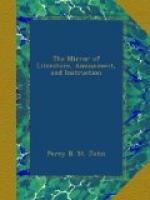* * * * *
THE SKETCH-BOOK
* * * * *
COWES REGATTA.
A SCENE IN THE ISLE OF WIGHT.
(For the Mirror.)
The crowded yachts were anchor’d
in the roads,
To view the contest for a
kingly prize;
Voluptuous beauty smil’d on Britain’s
lords,
And fashion dazzled with her
thousand dyes;
And far away the rival barks were seen,
(The ample wind expanding
every sail)
To climb the billows of the watery green,
As stream’d their pennons
on the favouring gale:
The victor vessel gain’d the sovereign
boon;
The gothic palace and the gay saloon,
Begemm’d with eyes that
pierc’d the hiding veil,
Echoed to music and its merry glee
And cannon roll’d its thunder o’er
the sea,
To greet that vessel for her
gallant sail.
Sonnets on Isle of Wight Scenery.
To those readers of the MIRROR who have not witnessed an Isle of Wight Regatta, a description of that fete may not be uninteresting. From the days assigned to the nautical contest, we will select that on which his Majesty’s Cup was sailed for, on Monday, the 13th of August, 1827, as the most copious illustration of the scene; beginning with Newport, the fons et origo of the “doings” of that remembered day. Dramatically speaking, the scene High-street, the time “we may suppose near ten o’clock,” A.M.; all silent as the woods which skirt the river Medina, so that to hazard a gloomy analogy, you might presume that some plague had swept away the population from the sunny streets; the deathlike calm being only broken by the sounds of sundry sashes, lifted by the dust-exterminating housemaid; or the clattering of the boots and spurs of some lonely ensign issuing from the portals of the Literary Institution, condemned to lounge away his hours in High-street. The solitary adjuncts of the deserted promenade may be comprised in the loitering waiter at the Bugle, amusing himself with his watch-chain, and anxiously listening for the roll of some welcome carriage—the sullen urchin, reluctantly wending his way to school, whilst
“His
eyes
Are with his heart, and that is far away;”
amidst the assemblage of yachts and boats, and dukes and lords, and oranges and gingerbread, at Cowes Regatta.




